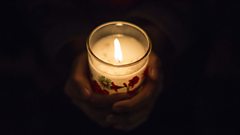Rev Dr Sam Wells - 13/12/2017
Thought for the Day
Good morning. The 1989 French-Canadian film Jesus of Montreal depicts several contemporary adaptations of the life of Christ. In a plush office overlooking the whole city a devilish lawyer tempts Jesus with fame and power, imitating Christ’s time in the wilderness. The cleansing of the temple becomes Jesus protesting the sexual objectification of women. Christ’s resurrection is portrayed as a series of organ transplants: his death gives life to many.
Yesterday a national consultation began on organ transplantation. The current assumption is that your organs are buried with you, unless you sign onto a donor register. The proposal is to move to a system of presumed consent, by which unless you explicitly opt out of the programme, your organs automatically become available, pending your family’s agreement.
For health administrators and government ministers this is simply pragmatism: they want the maximum number of organs donated, and are evaluating whether this will achieve that end, or prove draconian and counterproductive. But beneath the public health challenge and the legalities are profound questions about who we really are and to whom our bodies truly belong.
For Christians the meaning of baptism is that they allow their body to become part of a more definitive body known as the body of Christ. The unit of life changes – once it was the individual body, now it’s the collective body. So if you have two kidneys and a person struggling under dialysis could receive one of yours, you don’t simply say ‘But this is mine!’ The word ‘mine’ loses some of its exclusivity – what’s mine can become yours, if it gives you abundant life and I don’t need it.
Years ago, long before organ donation was yet possible, many people saw keeping the body intact, even in the grave, as crucial to hope in bodily resurrection. That made organ donation unthinkable. But the notion of the body of Christ challenges such concentration on the integrity of individual bodies. It encourages us to perceive our body as something we may lay down to give life to others.
The seventeenth-century poet John Donne famously wrote, ‘No man is an island, entire of itself; every man is a piece of the continent, a part of the main.’ He’s exploring that same idea of baptism, by which we recognise our nature and destiny is not ours alone but is bound up in one another. Less well known are his immediately preceding words. ‘All mankind is of one author, and is one volume; when one man dies, one chapter is not torn out of the book, but translated into a better language; and every chapter must be so translated.’
Perhaps the real question about organ donation is about imagining the chapter of our lives being translated into a better language.
Duration:
This clip is from
More clips from Thought for the Day
-
![]()
Daniel Greenberg - 14/11/2025
Duration: 02:46
-
![]()
Professor Michael Hurley - 13/11/2025
Duration: 03:05
-
![]()
Rev Roy Jenkins - 12/11/2025
Duration: 03:07
-
![]()
Professor Mona Siddiqui - 11/11/2025
Duration: 02:59






